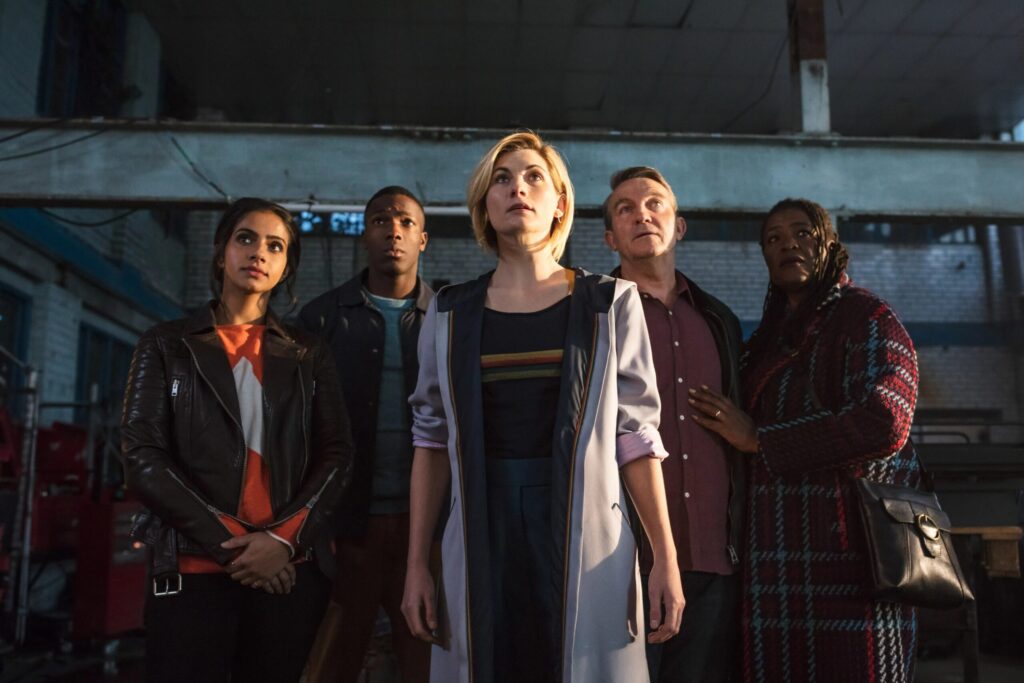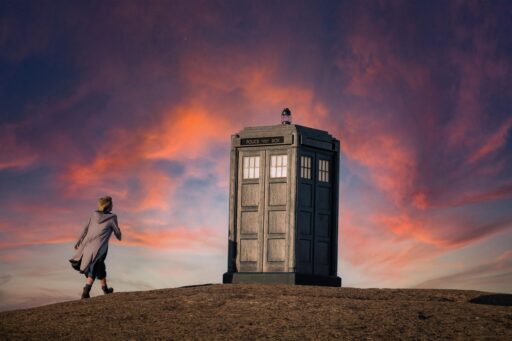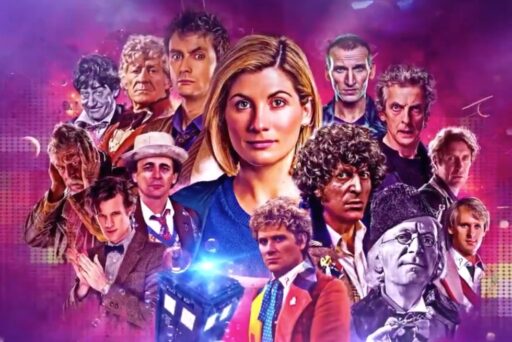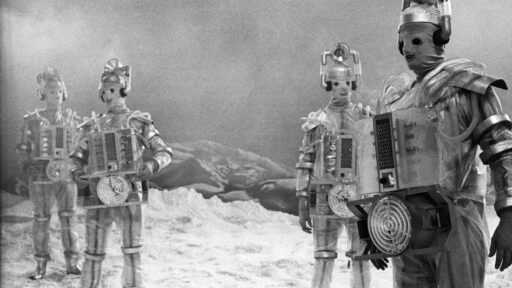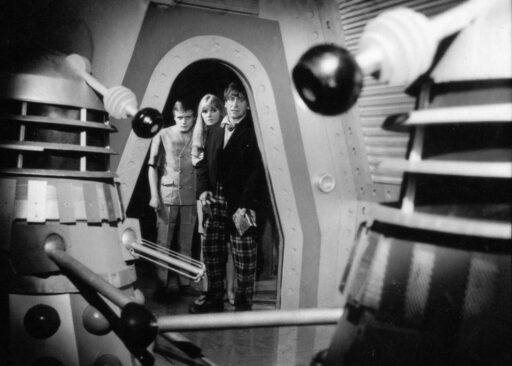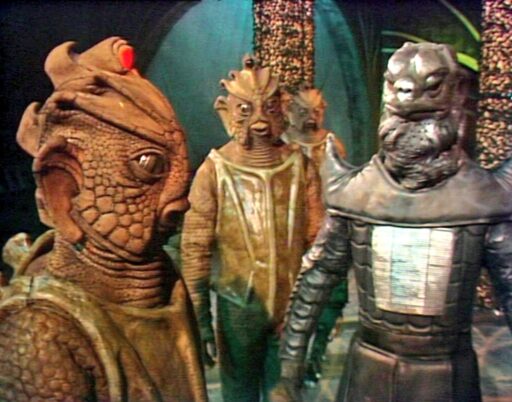A lot of weight falls on this episode being the beginning of both Chris Chibnall’s run and Jodie Whittaker’s first appearance as the Doctor. Not only should it set the tone and the standard for the show going forward, but obviously it would hope to capitalize on the publicity to attract a new audience and convince them to keep watching. We all know how the viewing figures progressed, but they did start strong.
Change, My Dear
It’s one of those things that gets said so often it barely means anything anymore but it’s true that Doctor Who is a uniquely adaptable show. New locations, new companions, new Doctor, new look. The show isn’t even beholden to its own past much of the time due the absence of an official canon and a laissez-faire approach to continuity which I refer to as weighted continuity (more on that later). While there are a handful of common elements that exist throughout the life of the show, it does provide a remarkable amount of room for reinvention and change is almost a constant.
Naturally a new Doctor and new showrunner at the same time is when we see the biggest changes in the show and that’s certainly true again with this episode. Not only do we get our first female Doctor but this looks and feels different to what has come before. I’m no expert on cinematography, still photography is more my scene, and I’ve seen both positive and negative opinions on the camerawork for this season but it is visually distinct to the seasons that preceded it. Overall it has a look that lines up with more modern shows and one thing I particularly noticed in this episode was the way shadows and light were used to add to the atmosphere in a way that previous episodes rarely managed to achieve.
The show also looks different in another way. I’m going to use the D word, yes this is the most diverse that Doctor Who has been to date and that’s a great thing. We don’t just have one or two token people of color, we have a wide variety in both major and minor roles. I think some people understand the intention behind diversity. It’s not to have one example of everything on screen, nor is it to provide idealized versions of each ethnicity. It’s to have enough variety that you can treat those people just like other characters. “Bury your Gays” for example is much less of a problem when you have a multitude of such characters and the death of one is no longer the death of what they had been chosen to singularly represent.
This episode also feels different. It’s less witty and less zany than previous seasons. It’s not that nothing funny ever happens or is said, but the overall tone seems more serious to me and the dialogue between characters is to my ear more naturalistic which can come across as flat at times.
The Fam
I mostly wrote that heading because I know it will irritate some people. Is it something that I personally would say? Nope, but it does fit well with this particular Doctor I think.

One thing that stuck out to me re-watching the episode is that the Doctor’s new companions are very much of this location. It’s not just that the show starts its new era outside London (Shefield to be specific) and gives us a torrent of regional accents, though I very much appreciated that, it’s that they are clearly living lives here, not just existing. The essence of those lives is shown to us in the first few minutes of the show before our new Doctor has even shown up. Where very often Companions feel like a character designed for the Doctor to interact with (how many fans play “spot the new companion?”), these felt to me like people who get swept up in the Doctor’s wake. They haven’t been waiting for someone like the Doctor to enter their lives and they probably wouldn’t have gone with her if not for the accident at the end of the episode.
Everything you need to know about the core of Graham, Ryan and Yaz characters is right there in the first 12 minutes of this episode, it’s a very efficient and effective bit of writing. Unfortunately it does then rather hit you on the head with people telling you most of the same information in case you missed it. I have a theory, which we’ll keep an eye on as I watch future episodes, that this is not accidental, but it can be annoying.
Ryan’s dyspraxia is threaded throughout the story with some skill, neither ignored nor completely defining him as a character. Near the end where we see him continue to try to ride a bike it is far more important that he fails and keeps trying than that we would see him succeed. To be clear, I’m talking about this episode. I don’t think it’s always handled this well and I’ll touch back on it in later reviews.
Plot and Pacing
This episode moves fast. It doesn’t let up for most of its running time, really not until the funeral. We’ve become used to Doctor Who being a fast paced show and on the evidence of this episode there were no plans to change that. The longer running time does help a little in that we do get a chance to have a slower and more reflective moment near the end though.
As far as the plot of this episode is concerned it’s pretty basic, but that is true of a lot of regeneration stories as the focus gets split by the need to establish a new Doctor. You could equally argue that Rose, The Eleventh Hour or Deep Breath are all small scale stories too and I wouldn’t disagree. Compared directly to those I think The Woman Who Fell to Earth holds up while giving enough of a storyline to keep the viewer entertained while getting all the other balls in motion. At its core we’ve got a nasty alien bent on killing a few people for personal glory. Nothing to fancy but enough to engage with. One huge plus though is that due to the temporary memory loss we’re spared yet another Doctor Speech which is something that had become terribly overused.
The alien “Tim Shaw” has a wonderfully creepy look to him, but he does seem to have that common flaw of villains where he explains all the details of his plan so that everyone (including the audience) knows what’s going on. Not ideal from my perspective as I think I’d have preferred it if some of the plan was worked out by our team.
One thing that I do like is that even minor victims get a moment to show personality and give us some reason to care about their inevitable demise. It may only be a few seconds or a minute, but they have a little life and agency to them. Yes in the end they are redshirts but the history of Doctor Who is full of redshirt characters.
Another interesting aspect of this episode is how much time there is after the plot has been resolved. We don’t often see the Doctor stay in one place and almost never see her involved in normal life. It’s a fascinating choice that gives Jodie Whittaker time to do some very subtle acting and it does lead to an excellent cliffhanger.
As I mentioned earlier there’s less funny here than we’ve become used to. This is more serious and less knowingly clever than we’d been used to. One of my pet theories is that Chibnall had an intention to move the show in a different direction than we’d had previously. I think this episode supports that, but whether the remaining episodes do, well, we’ll see when we get to reviewing them.
Fridging
To address the elephant in the script, by definition Grace’s death is a fridging. Her death, and indeed her character, is only there to further Graham and Ryan’s plot and propel them into the TARDIS, so that’s pretty much a dictionary definition. I’m going to argue though that like many of these terms (Bechdel Test comes to mind) the issue is not with the death but with the overuse of the device and the type of characters who it gets used on. So I’d refer back to what I wrote earlier about the importance of diversity and the difference that makes. While there are still some problems with the black female being killed to further the plot, I don’t think it’s nearly as egregious as it would have been if only white males were receiving the benefits of this plot device.
The Doctor
When the Doctor is first introduced we’re given some very familiar traits to hook on to. She talks fast, she’s quirky, quick witted, takes charge and rapidly resolves the immediate threat. This is what we have come to expect from a modern version of the Doctor and so it’s reassuring to the viewer. Of course that is a primary function of any regeneration story, make sure there’s enough familiarity that you don’t scare the audience away even as you set up the new status quo.

As the episode goes on it starts to define some differences between the 13th Doctor and her predecessors. She seems more hesitant and uncertain at times than her recent predecessors and in this regard amongst others reminds me of the Fifth Doctor. In the end though it feels to me that we’re coloring in the lines of what has already been established as a modern Doctor archetype and an opportunity was missed to go in a radically new direction. In this episode her practical skills in making the Sonic Screwdriver were great to see but I don’t recall that being a focus point throughout the season so I’ll watch with interest to see if I’ve forgotten something.
She’s also much more inclined towards narrating what she’s doing which I suspect is part of a deliberate intent on Chibnall’s part as I mentioned earlier. If you watch Classic Doctor Who you’ll see a lot of this type of dialogue which is basically intended to fill in the gaps for anything the viewer hadn’t understood. In this first episode it did not bother me much, at other times it may seem more blatant.
Morality
Very early on this doctor takes a firm stance against weapons, not just guns but knives as well. The message is clear, she sees them as a lazy shortcut and something that encourages people to jump to a violent solution before giving other options a chance. This isn’t something radically new to the Doctor’s character but she takes a more vocal stance on it. The Doctor can be quite hypocritical on this topic, as most people are, but that line of thinking matches up with a lot of old-school Who.
Her stand off with “Tim Shaw” shows another central part of her morality. Individuals matter to her regardless of their status. As she mentions, Tim Shaw does this to himself, she gives him a choice and it’s his own rejection that “kills” him. Her anger with Karl is because he didn’t give Tim Shaw a choice and he wasn’t acting in self defense. That difference matters to her and I appreciate the level of subtlety at play there in her morality.
Summary
I’ve alluded a few times to my belief that certain things are a deliberate decision on Chibnall’s part, I also think we’re going to see some outside factors come into play as well, but I’m going to hold off on really diving into that for later episodes when we have more evidence to work with.
For my money this was a strong regeneration episode. It established our new Doctor and her dynamic with her companions while giving me an entertaining story of the week. It stands up well to re-watching too, which can’t be said of all regeneration stories. I’m not sure that I’d put it up there with Power of the Daleks of Spearhead from Space, but a polished outing nonetheless.
I came away from the episode really liking this Doctor. Her enthusiasm, her positivity and her uncertainty all appeal to me. I’m on the fence about the more serious tone, but visually I really like it.
Rating: I don’t do ratings, I think they’re stupid.
Discover more from Veristopia
Subscribe to get the latest posts sent to your email.


